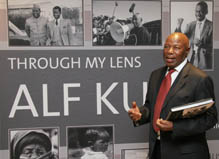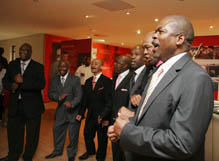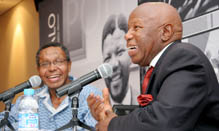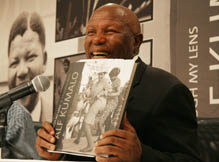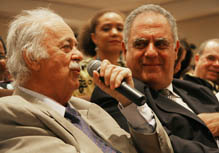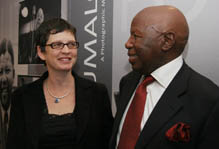
Tanya Farber and Alf Kumalo at the launch of Through My Lens
October 15, 2009 – The Nelson Mandela Foundation hosted the launch of veteran photographer Alf Kumalo’s book Through My Lens last night.
The book, Kumalo’s third, was published by NB Publishers and tells the story of his life through his pictures and the text of award-winning journalist Tanya Farber.
Famous for his political work as well as pictures of celebrities and notable figures, both in South Africa and abroad, Kumalo also has a remarkable collection of photos of Mr Mandela. Shots of Mr Mandela with his children, Makgatho and Makaziwe, and moments with his then wife Winnie Madikizela-Mandela are included in the book.
Welcoming people to the exhibition, Verne Harris, head of the Foundation’s Memory Programme and acting Chief Executive said that what made this exhibition possible was Mr Mandela’s mandate to the Foundation that even records that potentially opened him up for criticism were to be shown.
“Contestation is healthy, says Mr Mandela,” said Harris, before explicating the importance of Kumalo’s work in relation to the work of the Foundation.
“The [Foundation’s] Centres of Memory and Dialogue have developed a fantastic working relationship with one of South Africa’s most famous photographers ... [and] it’s impossible to do any memory work around Mr Mandela without using the work of Alf Kumalo,” Harris said. “In addition, we have given quite a bit of research support to the book project and so for us hosting this event is a perfect match.”
Speaking at the event, Farber said while many photographers rode on the reputation of one great photo, the same could not be said of Kumalo.
“Today is the first time in 10 years I’ve seen him without his camera dangling around his neck,” she said. Kumalo had worked hard, she explained, often putting himself in dangerous situations, to ensure that he was at the events where he had taken some of his most significant photos.
Farber said that she was honoured to have been part of the project.
“Alf and I got chatting one day about this project at The Star and now a few years later we have this book,” she said. “It’s been an incredible experience for me.”
As part of the event Joe Thloloe, South Africa’s press ombudsman and former Sowetan deputy editor, interviewed Kumalo about his book, before inviting questions from the audience.
Speaking about his creative process during the Q&A with Thloloe, Kumalo said events and photos from the past often influenced his work. He described how a shot he had taken of a newspaper poster announcing the death of American civil rights activist Martin Luther King had influenced the way he covered the death of South African activist Chris Hani 25 years later.
Kumalo answered each of Thloloe’s questions sincerely and with great humility, with an incredible recall for the circumstances in which particular photos had been taken – the surrounds, historical background and context, as well as the characters.
Speaking about advances in photographic technology, Kumalo said that the new technology was “fantastic for newspapers and magazines”, as it made publishing easier and quicker.
Kumalo said that a full biography was something he “would love to do” but that he had no immediate plans to do so.
Responding to questions from the audience, Kumalo said that there were many photographers he admired, among them his friend Gordon Parks, and that he had never thought of retiring, despite the fact that his own life had often been in danger while he covered events.
He said that he had never felt in danger at the time he was taking photos during conflict situations and that only afterwards had he wondered at his own sanity.
“I’ve missed death so many times,” he said, “I feel very, very fortunate to be alive.”
In closing, Kumalo thanked everyone who had come to the launch and said he felt a great sense of achievement at the completion of the book.
Kumalo has photographed some of the world’s most famous figures, from Nelson Mandela to Muhammad Ali, from Miriam Makeba to Frank Sinatra, won numerous awards, both local and international, and has a museum of photography in Soweto.
